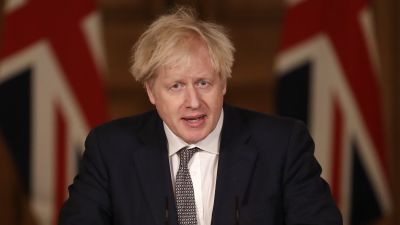By Ben Kerrigan-
British prime minister, Boris Johnson, pointed out that the lockdown – not the rapid vaccine rollout – is responsible for the “bulk of the work” to reduce infections, hospitalisations and deaths across the UK. He suggested that as restrictions are eased, a slight uptick in cases is inevitable.
The prime minister’s comments were completely opposite to the last serious statement he made weeks ago, when he tod reporters that the success of the vaccine had been down to capitalism and greed, before quickly telling reporters to erase it from their memory.
“People, I don’t think, appreciate that it’s the lockdown that has been overwhelmingly important in delivering this improvement,” Mr Johnson said. “Of course the vaccination programme has helped, but the bulk of work in reducing disease has been done by the lockdown.
“So, as we unlock, the result will inevitably be that we will see more infection, sadly we will see more hospitalisation and deaths, People have just got to understand that.”
Johnson’s comments seem to contradict that of Professor Jeremy Brown, a member of the Joint Committee of Vaccination and Immunisation (JCVI), who told the BBC Radio 4 that those who have not been vaccinated could end up in hospital, as he stressed the importance of reaching those at risk and unprotected.
“The problem here is that that five or 10 per cent who have not been vaccinated, when the virus re-circulates through the community, they could get infected and end up in hospital,” he said. “So it’s vitally important that we get that last few percent.
Officials at the Department of Health and Social Care have insisted that the offer of a vaccine is “evergreen”, and those who have already been invited for a jab can come forward at any point.
.”Together with the European Medicines Authority we are monitoring the situation very closely”, the CBG said. “For now, the benefits of the vaccine outweigh the possible risks.”
The US agencies made their recommendation after six recipients developed a rare disorder involving blood clots. A press conference is expected at 3pm from the FDA to extrapolate on the decision.
Speaking to broadcasters in Downing Street, the Prime Minister warned that the “bulk of the work” in reducing new cases, hospitalisations and deaths in the UK has been down to the lockdown – rather than the rapid vaccination rollout.
But the Prime Minister insisted that this increase does not mean that the current roadmap out of lockdown should be adjusted – though he urged people to be “cautious” as they return to some semblance of normality.
“At the moment I can’t see any reason for us to change the road map, to deviate from the targets that we’ve set ourselves,” he said.
The NHS in England said 19 out of 20 of those most at risk from the virus have now received their first dose of a vaccine.
An estimated 27 million people in England are in the top nine priority groups for the vaccination – including over-50s, people deemed to be clinically extremely vulnerable, and health and social care workers. This means it is likely around 25.7 million have received their first Covid-19 jab.
Professor Jeremy Brown, a member of the Joint Committee of Vaccination and Immunisation (JCVI), told BBC: “The problem here is that that five or 10 per cent who have not been vaccinated, when the virus re-circulates through the community, they could get infected and end up in hospital, so it’s vitally important that we get that last few percent.”
The Department of Health and Social Care said that, in England, around 95 per cent of people aged 50 and over have received a first dose, while 92 per cent of people who are clinically extremely vulnerable to Covid-19 have also had a vaccination.

